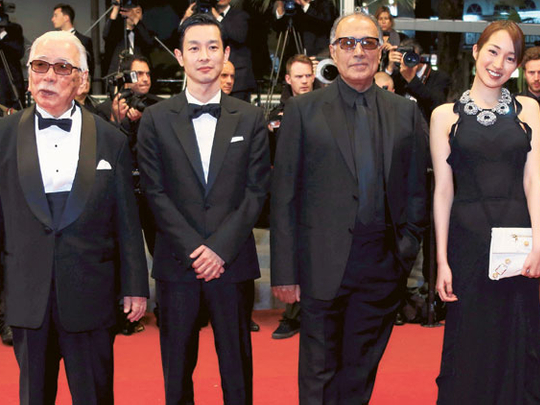
Abbas Kiarostami has found inspiration far from home.
The Iranian director's films are routinely banned in his home country, whose Islamist government has arrested or barred several younger filmmakers from working.
The 72-year-old auteur has responded by looking abroad for inspiration. His last feature, Certified Copy, was shot in Italy, and his new Cannes Film Festival entry, Like Someone in Love, was made in Tokyo, in Japanese and with a Japanese cast.
"In the past few years for fairly obvious reasons, perhaps, I had to work outside Iran," Kiarostami told reporters in Cannes on Monday, saying this presented him with a challenge. "How could I convey to you what I had in my imagination without resorting to geography?"
Kiarostami built a global reputation with simple stories told with passion and conviction in Iran-set films like Life and Nothing More and Through the Olive Trees. He said now setting a story in Japan had allowed him to "prove what I'm deeply convinced of — that we all share the same human condition".
"That runs against something I thought in the past," the director said. "I thought Japan and the Japanese must be the country and the people that were the most removed from me."
Like Someone in Love — the title comes from an Ella Fitzgerald song — involves a listless young student who moonlights as a call girl, her mechanic boyfriend and an elderly professor who becomes involved in her life. It unfolds in the bustle and neon of Tokyo, but retains Kiarostami's usual languid pace and naturalistic performances.
"We didn't receive a script. That's the first time that's happened," said Tadashi Okuno, who plays the professor. Rin Takanashi is the student and Ryo Kase — who appeared in Gus Van Sant's Restless and Clint Eastwood's Letters From Iwo Jima — plays her working-class boyfriend.
automotive settings
"He said we had to be ourselves, we had to be very natural. He didn't want a contrived character. That's why it was good for him to work with an actor like me — because I don't know how to act that well," Okuno said.
Kiarostami fans will be happy to know the film also includes another of the director's staples — scenes of characters talking and sometimes sleeping as they drive in cars.
Asked about his fondness for automotive settings, Kiarostami said a car is "a place like anywhere else. And I think it's even better than may other places. There are lots of advantages".
"People can't just escape from the conversation because they've got their seat belts on," he said. "If you don't have an answer you can't just stand up and walk away if you're in a car."
Kiarostami won Cannes' top prize, the Palme d'Or, in 1997 for Taste of Cherry. But his new film has had a mixed reception. Some critics were bemused by its abrupt ending — The Guardian newspaper's Peter Bradshaw felt "the curtain comes down with an arbitrary crash just as the drama was becoming interesting".
Kiarostami said he felt the ending was appropriate but he was a bit surprised that he got away with it.
"I expected the producers to say, ‘Your film doesn't have an ending.' Then gradually I realised my film doesn't have a beginning, either," he said. "Then I realised that's what happens in real life."











